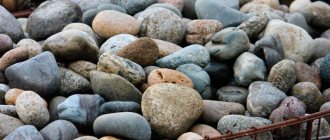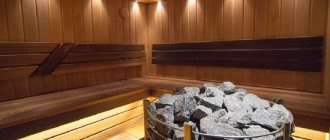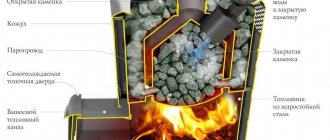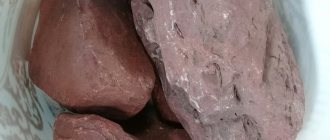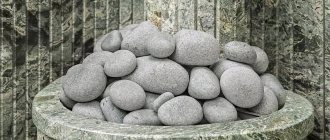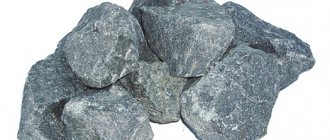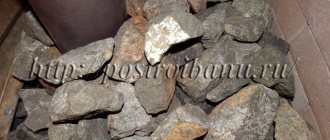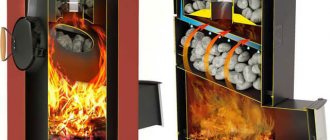What stones are best for a sauna stove? This is the question that should be asked to everyone who is planning to build a bathhouse. Why is such attention given to stones? The answer is simple: it is with them that water comes into contact, and steam is produced, i.e. The quality of the stones directly affects the quality of the steam itself.
Next we will talk about how to choose stones for a bath yourself: what to pay close attention to, how to check their quality?
Bath stones: requirements and properties
The bathhouse has its own conditions: high temperature, high humidity, so to select its main attributes, you set your own requirements.
When you choose which stones are best for a bath, be sure to make sure that they meet the following requirements:
High temperature resistance
Resistance to temperature changes is a necessity, since the stones will be regularly subjected to temperature tests: first they are heated to a high temperature, and then they are suddenly poured with cold water, and unevenly. It is important that the stones can withstand such a load. They should not crack or break after the first time. Thermal resistance is measured as the number of heating/cooling cycles that a stone can withstand before it begins to break down. The higher this indicator, the better the quality of the stones for the sauna stove.
High heat capacity
It represents the ability of stones to accumulate heat, i.e. is defined as the amount of heat that 1 kg of stone absorbs when it is heated by 1C. The higher this indicator, the better. If the stones have a high heat capacity, then you can safely enjoy bathing procedures without being distracted by the constant addition of firewood to the firebox.
Uniformity
The stones should not have inclusions, all kinds of grains of sand, etc. Their presence can lead to the fact that due to uneven heating the stone will begin to collapse. In addition, stones of heterogeneous composition can “explode”, which is fraught with negative consequences.
Integrity
Obviously, the presence of any cracks is unacceptable. It’s easy to check stones for this indicator: just hit them with a hammer or against each other, if the sound is clear, then there are no defects.
Environmental friendliness
Often, when deciding which stones are best for a bath, many neglect this requirement, but in vain. Steam procedures will have a healing effect and give positive emotions only if the stones do not release harmful substances when heated, otherwise your health may worsen.
Same size
Of course, there are no identical stones, but it is important that they match their shapes and sizes as much as possible. This will ensure even heating and therefore good steam circulation. It is advisable to choose smooth and round stones.
The required size of stones depends on the type of sauna: large stones are usually selected for wood-burning saunas, and smaller ones for electric saunas. How many of them are needed depends on the heater of the stove. The stones for the bath are laid as follows: the largest ones are placed down, then the medium ones, and the smaller ones on top.
Please note that over time, stones lose their properties and deteriorate, so you need to review them annually and get rid of damaged ones.
What to look for when choosing
When choosing stones for a steam room, you need to consider the following:
- Size . Everything is simple here: the larger the stone, the greater the area of its evaporation and the amount of steam generated. But there is also a downside to the coin - a large mineral takes much longer to heat up, and more energy must be spent to achieve the required temperature. Which is a serious disadvantage if a wood stove acts as a heat source in the bathhouse.
- Heat capacity . This parameter determines how long the mineral is able to maintain high temperature. It depends on the type of stone, as well as on where it is located: in a closed or open oven.
- Form . At first glance, everything here depends solely on the aesthetic preferences of the owner of the bathhouse. Actually this is not true. Water flows better over round stones with smooth edges than over rectangular ones. As a result, they have a higher evaporation area and work much more efficiently.
Types of bath stones: breeds, their advantages and disadvantages
Today there are many types of stones that are suitable for a bathhouse. Next, we will look at the most popular options and also study their properties.
We recommend reading:
Sauna stoves "Kutkin" - four baths in one
River/sea pebbles
This is a free option in most cases. But it is important to choose the right pebbles, otherwise they will not last long. Choose slightly flattened stones that do not have red veins. Red inclusions are iron; when heated, it will oxidize, and this is quite harmful to the health of bathhouse visitors.
Jade
If we are talking about which stones to choose for a bath, then most will recommend jadeite. Today it is the most popular option. This stone has high strength (2-3 times more than other stones) and is absolutely safe. It will serve you faithfully for a long time.
The stone is also quite attractive in appearance: it has green and black shades. But in terms of price, it is not cheap at all. Jadeite also has health-improving functions: it stabilizes blood pressure and relaxes the nervous system.
Gabbro-diabase
It has a uniform dark gray color. The stone has high strength and low water absorption, which is important for a bathhouse, since it increases steam when heated. But gabbro-diabase takes a long time to gain heat, and if overheated strongly, it can emit a specific odor. It is not allowed to add essential oils to the water; soot will immediately appear on the stones.
If you are looking for cheap stones for a bath, then you should pay attention to gabbro-diabase.
Raspberry quartzite for baths
Crimson quartzite is 98% quartz, and the remaining 2% are hydroxides and iron oxides, which give it this bright color. The stone received this name due to its bright purple hue.
It is also called “Shoksha crimson quartzite”, because the only place where the stone is mined is the Shokshinsky quarry, located in Karelia. The quartzite deposit was discovered more than 200 years ago, the stone was actively used for the construction and decoration of government buildings, and today it is also available for use in the steam room.
This stone is dense, fire-resistant, wear-resistant and reliable. It has no chips and has a smooth surface.
The stone has a fine-grained and uniform structure; when heated, its components expand evenly. Due to its properties, quartzite for baths is most resistant to cracks even under conditions of aggressive temperature changes.
Another reason why quartzite is an excellent choice as a bath stone: it gives off heat over a long period of time, thereby maintaining the desired microclimate in the bath longer.
If you look at the reviews of crimson quartzite for a bathhouse, you are unlikely to come across any negative ones. This stone is really great for use in a steam room. Its main drawback is perhaps the price. Of course, crimson quartzite is an expensive pleasure. But the reason is simple: it is quite rare and has excellent performance properties and beautiful appearance.
In addition, crimson quartzite does not tolerate open fire well, so it is better to use it together with other types of stones (soapstone, gabbro-diabase, basalt), and lay quartzite on top of cheaper stones.
Rose quartzite for baths helps stabilize blood pressure, improve the functioning of the circulatory system, reduce pain in joints and muscles, destroy salt deposits in the body and strengthen the body. After such steam treatments, you will forget about your health problems!
White quartz
This is an environmentally friendly material. It has average characteristics: it can burst at excessively high temperatures, and also has average wear resistance. White quartz is quite expensive.
We recommend reading:
“Varvara” stoves - budget and high-quality stoves from a Russian manufacturer
But then why are such stones for sauna stoves in high demand? It's all about their appearance: smooth, translucent stones with a white tint look stylish, impressive and even luxurious.
Porphyrite
It has a high heat capacity, easily tolerates temperature changes, and is not afraid of excessively high temperatures.
Are you suffering from headaches? Such stones will help relieve migraines, heal the respiratory tract and improve skin condition.
Soapstone chlorite
Soapstone is also called "soapstone" and "potstone". Soapstone - what is it? It is a rock formed as a result of the combination of two inorganic components: magnetism and talc. For a million years, the formation of this amazing stone, used by people since ancient times, took place in the mountains.
It is light in weight, but at the same time has a high density and a good level of thermal conductivity. The stone has an attractive gray color, available in many shades. Therefore, it is often used for lining stoves.
What is important is that when heated, the stone releases enzymes that have a beneficial effect on humans: they improve metabolism and increase immunity. Soapstone emits a soft and pleasant warmth, thanks to which it has a positive effect on the joints.
Now you know what soapstone is and why it attracts so much attention. This stone is perfect not only for use in a heater, but also for building the stove itself, wall cladding, and even for making dishes.
Basalt
The stone is formed from solidified lava of a volcano. It has a dense structure and retains heat perfectly. Basalt is the most durable of all bath stones of volcanic origin; it can withstand strong temperature changes. It heats up quickly, gives off heat for a long time and produces steam well.
Bath basalt has high antibacterial properties, it disinfects the skin, improves the functioning of the respiratory system, helps cure colds and relieves migraines.
Despite its high performance properties, basalt has a fairly low cost.
Peridotite
The stone is of igneous origin and comes in a wide range of colors: from light gray to black. It contains no harmful impurities, so the stone is completely safe for people. Peridotite is well suited for a bath, because it has a high heat capacity, can give off heat for a long time and can withstand temperatures up to 1800 degrees. When reacting with carbon dioxide, the stone purifies the environment.
Typically, peridotite is placed at the bottom of the furnace, and covered on top with other stones that have a more pronounced healing effect.
It is quite difficult to say which stones are the best for a bath; each rock has advantages and disadvantages. Many people do the same thing with stones as with bath brooms, that is, they try different options: first one type of stone, then after 3-4 years another. This makes steaming procedures more varied, and also helps everyone choose an option to their liking.
Do you want to steam in a sauna with pleasure and pleasure? Choose the best stones for a bath, approach the issue with all responsibility. Then you are guaranteed good and fragrant steam in the steam room!
What options should you choose?
The following recommendations will help you make the right choice:
- river cobblestones are more durable than sea ones;
You can find quality pebbles yourself
- when purchasing material, in the instructions you can read about the required number of cobblestones for the steam room and the installation method;
- When collecting cobblestones yourself, it is better to choose them in the field rather than in the water. There are stronger stones that have been tested under the scorching sun;
- the stone must have round shapes and a smooth structure;
- There should be no impurities on the surface.
It is better to discard boulders with irregularities
